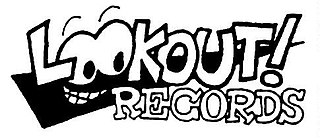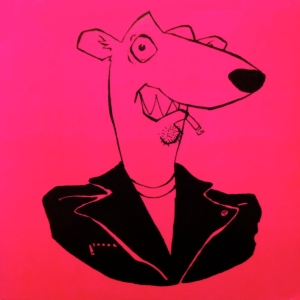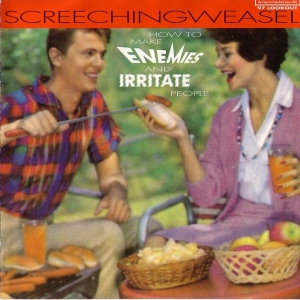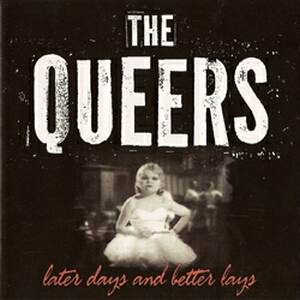
Lookout Records was an independent record label, initially based in Laytonville, California, and later in Berkeley, focusing on punk rock. Established in 1987, the label is best known for having released Operation Ivy’s only album, Energy, and Green Day's first two albums, 39/Smooth and Kerplunk.

The Queers are an American punk rock band, formed in 1981 by Portsmouth, New Hampshire native Joseph “Joe” P. King along with Scott Gildersleeve, and John “Jack” Hayes. With the addition of Keith Hages joining on bass in 1983 the band started playing their first public performances. The revised line-up played a total of six live shows between 1983 and 1984. This earliest era of The Queers formation initially broke up in late 1984; however, Joe Queer re-formed the band with an all-new line-up in 1986. In 1990, after several more band line-up changes the band signed with Shakin' Street Records to release their debut album, Grow Up. The album earned the band notability within New England, but with the release of their next album, 1993's Love Songs for the Retarded, on Lookout! Records, their following grew.

Energy is the only studio album by the American ska punk band Operation Ivy. It was originally released on vinyl and cassette in May 1989 through Lookout! Records with the catalog number LK 010. Although the album itself has never been released on CD, all of the tracks were featured on the career-spanning compilation Operation Ivy issued by Lookout in 1991. Despite achieving no mainstream success, Energy is considered one of the most important albums of ska punk and is frequently cited as an influence by many later bands of the genre.
Sweet Baby was a pop punk band that originated from Berkeley, California, and was part of the 924 Gilman Street scene. They were signed to Ruby Records.
Squirtgun is an American punk rock band from Lafayette, Indiana formed by record producer Mass Giorgini in 1993.

Boogadaboogadaboogada! is the second studio album by the Chicago-based punk rock band Screeching Weasel. The album was originally released on vinyl in December 1988 through Roadkill Records. It was the group's only album to feature Fish on bass and the last with Steve Cheese on drums, both leaving the band shortly after the album's release. Although still influenced by hardcore punk, the album also shows hints of the band's later Ramones-inspired sound.

My Brain Hurts is the third studio album by the Chicago-based punk rock band Screeching Weasel. The album was originally released on CD, vinyl and cassette in September 1991 through Lookout Records. It was the group's first album on Lookout as well as the only release with bassist Dave Naked and the first with drummer Dan Panic, the latter of which would go on to appear on several of the band's albums. The album marked a very distinct stylistic shift for the group, fully moving toward a Ramones-inspired sound and completely abandoning their previous hardcore punk influences as a condition made by vocalist Ben Weasel when reforming the band after a brief break-up.

Wiggle is the fifth studio album by the Chicago-based punk rock band Screeching Weasel. Initially planned for release in November 1992, the album was finally released on CD, vinyl and cassette on January 15, 1993, through Lookout Records. Due to a "cymbal hissing" in the original vinyl version, the album was remixed and re-released soon afterwards.

How to Make Enemies and Irritate People is the seventh studio album by the Chicago-based punk rock band Screeching Weasel. Planned as the group's final album, it was released in August 1994 on CD, vinyl, and cassette through Lookout Records. Shortly before recording the album, bassist/backing vocalist Dan Vapid left the band and, as a result, Green Day bassist Mike Dirnt was recruited to play on the album.

Love Songs for the Retarded is the second studio album by the American punk rock band the Queers, released in 1993 by Lookout! Records. It was the first of five studio albums the band would record for Lookout!, and their first by the lineup of singer and guitarist "Joe Queer" King, bassist Chris "B-Face" Barnard, and drummer Hugh O'Neill. It was also their first collaboration with Screeching Weasel frontman Ben Weasel, who produced the album and co-wrote two of its songs, and the first of three Queers albums recorded at Sonic Iguana Studio in Lafayette, Indiana with audio engineer Mass Giorgini, who would continue to work with the band on and off for the next 14 years as a producer and engineer. Love Songs for the Retarded became the Queers' highest-selling album, with sales surpassing 100,000 copies.

Grow Up is the debut album by the American punk rock band the Queers. Recorded in multiple sessions between 1986 and 1988, with various band members and session musicians backing singer and guitarist Joe King, it was originally released as an LP record in 1990 by British label Shakin' Street Records. However, the label went out of business after only 1,000 copies were pressed. The Queers had more copies pressed themselves, continuing to list Shakin' Street as the record label, but when they failed to pay their bill the pressing plant destroyed all but approximately 160 copies, which the band released with a photocopied album cover.

Beat Off is the fourth studio album by the American punk rock band the Queers, released in 1994 by Lookout! Records. Recorded during a time when the Queers' usual drummer, Hugh O'Neill, was on a forced leave of absence from the band to deal with heroin addiction, it featured Screeching Weasel drummer Dan Panic and guitarist Dan Vapid added to the lineup. It was the third and final Queers album produced by Screeching Weasel singer Ben Weasel, who insisted on a no-frills punk sound for the album and removed Vapid's tracks from the final mix without his knowledge.

Move Back Home is the fifth studio album by the American punk rock band the Queers, released in May 1995 by Lookout! Records. The recording sessions were marred by the band members' drug problems, and many of the songs were written in the studio. Producer and Lookout! president Larry Livermore was so displeased with the result that he took his name off of the album, and several involved parties, including singer and guitarist Joe Queer, later regarded it as sub-par. After the Queers rescinded their master recordings from Lookout! in 2006, Move Back Home was reissued by Asian Man Records the following year, having been remixed and remastered by Queer and recording engineer Mass Giorgini and with the tracks from the Surf Goddess EP added.

A Day Late and a Dollar Short is a compilation album by the American punk rock band the Queers, released in January 1996 by Lookout! Records. It collects material recorded between 1982 and 1994, most of it with original member Wimpy Rutherford. It includes the band's first two EPs, 1982's Love Me and 1984's Kicked Out of the Webelos, several demo tracks recorded in 1991, 16 tracks recorded during a January 1993 reunion with Rutherford, and a complete set of early songs recorded live on radio station WFMU in 1994 with Rutherford on lead vocals.

Surf Goddess is an EP by the American punk rock band the Queers, released in February 1995 by Lookout! Records. It marked the return of longtime drummer Hugh O'Neill to the band, after a forced leave of absence to deal with heroin addiction. Former Screeching Weasel member Dan Vapid, who had been a member of the Queers in 1994, played on the EP as a guest guitarist. Surf Goddess was the result of band leader Joe King and Lookout! head Larry Livermore being dissatisfied with the production techniques on the band's prior album, 1994's Beat Off, which producer Ben Weasel had insisted on keeping basic. King and Livermore wanted to incorporate overdubbing and other effects which Livermore felt were essential to the Queers' sound. In addition to the title track, which was co-written by Weasel, and the Queers original "Quit Talkin'", the EP includes cover versions of Tommy James and the Shondells's "Mirage" and the Undertones' "Get Over You".

Punk Rock Confidential is the sixth full-length album by pop punk band The Queers and their first album released on Hopeless Records.

Later Days and Better Lays is a compilation album by the American punk rock band the Queers, released in March 1999 by Lookout! Records. It combines a 14-song demo tape from 1991 with some demos recorded in the lead-up to their 1996 album Don't Back Down, as well as some outtakes from that album's recording sessions. The compilation fulfilled the band's contractual obligations to Lookout!, following seven years and four studio albums on the label. They moved on to Hopeless Records, but would return to Lookout! for the Today EP (2001) and album Pleasant Screams (2002) before parting ways with the label again.
The Riptides are a Canadian punk rock band formed in 1998 in Ottawa, Ontario.

The discography of the Queers, an American punk rock band, consists of 13 studio albums, 9 live albums, 4 compilation albums, 1 video album, 3 music videos, 22 EPs, 1 single, and 1 split album.
Between 1993 and 2000, a series of Ramones covers albums were released by Selfless Records, an independent record label based in Garland, Texas specializing in punk rock, on which bands influenced by seminal punk group the Ramones performed cover versions of entire Ramones albums. Under the Selfless label, Screeching Weasel, the Queers, and the Vindictives respectively covered the first three Ramones albums: Ramones (1976), Rocket to Russia (1977), and Leave Home (1977). Selfless then became Clearview Records and continued the series, with Boris the Sprinkler, the Parasites, the Mr. T Experience, the Beatnik Termites, and the McRackins respectively covering End of the Century (1980), It's Alive (1979), Road to Ruin (1978), Pleasant Dreams (1981), and Too Tough to Die (1984).

















